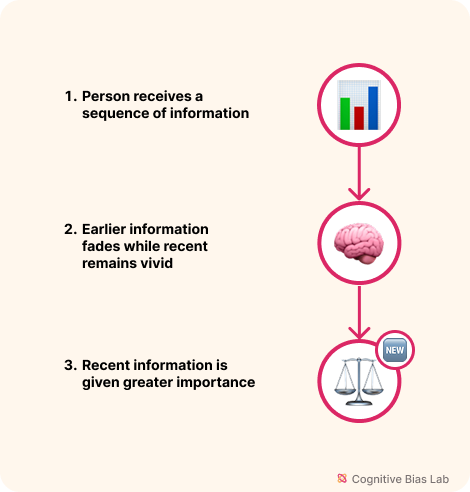Recency Effect
Your progress on this bias test won't be saved after you close your browser.
Understanding Recency Effect
Recency Effect
We tend to remember and heavily weigh the most recent information we encounter, often at the expense of earlier details. This can significantly skew our decisions, especially when evaluating complex situations over time.
Overview
The Recency Effect is a cognitive bias where individuals are more likely to recall the last items in a sequence more accurately than those that appeared earlier. This phenomenon is part of the broader serial position effect, which explains how the order of information presentation impacts memory and recall.
Psychological Basis
The Recency Effect arises because information presented most recently remains active in working memory, making it more accessible and easier to retrieve. In contrast to the Primacy Effect, which benefits from rehearsal and long-term encoding, the Recency Effect relies on temporary availability. Without delay or interference, recent information often dominates decision-making.
Close Relationship to Primacy Effect
While the Recency Effect enhances memory for items at the end of a sequence, the Primacy Effect boosts recall of the first items. Together, they produce a U-shaped recall curve, where both early and late items are remembered better than those in the middle. Failing to recognize this can lead to biased evaluations based on sequence position rather than content quality.
Real-World Implications
The Recency Effect can distort judgment in contexts that involve sequential information, including performance reviews, presentations, interviews, and decision-making. People may place disproportionate weight on the last thing they saw, heard, or experienced, regardless of its actual relevance or value.
Practical Consequences
Left unchecked, the Recency Effect can result in short-sighted decisions and imbalanced assessments. To counteract it, individuals and organizations can adopt strategies like structured review frameworks, delayed decision-making, or randomized content order. These interventions help ensure that all relevant information—regardless of when it appears—is given fair consideration.

Visual representation of Recency Effect (click to enlarge)
Examples of Recency Effect
Here are some real-world examples that demonstrate how this bias affects our thinking:
Job Interview Evaluation
A hiring manager interviews five candidates in one day. The final candidate performs well but is merely above average compared to the day's second interviewee, who was exceptional. Nevertheless, the manager feels most positively inclined toward the last candidate because their performance remains freshest in memory. This recency effect leads the manager to potentially overlook the strongest candidate simply because they weren't interviewed last.
Quarterly Business Review
A company's leadership team reviews the past quarter's performance. Despite strong growth in the first two months, a slight downturn in the final month dominates the discussion. Executives become unnecessarily concerned about the business trajectory and make reactive decisions based primarily on the most recent data point rather than the overall positive trend. This recency-biased evaluation leads to misallocated resources and strategic overcorrections.
How to Overcome Recency Effect
Here are strategies to help you recognize and overcome this bias:
Rotate the Order of Presentation
When evaluating multiple options (e.g., candidates, proposals), randomize or rotate the order in which you review them. This reduces the chance that early items receive an unfair advantage.
Take Structured Notes
Use a structured evaluation sheet that forces you to assess each option by the same criteria, helping to mitigate early memory bias and ensuring more balanced recall and judgment.
Test Your Understanding
Challenge yourself with these questions to see how well you understand this cognitive bias:
A manager conducts quarterly performance reviews. Although an employee showed steady improvement for most of the year, the manager lowers their rating due to a recent minor error. What most likely influenced the manager's judgment?
Academic References
- Murdock, B. B. (1962). The serial position effect of free recall. *Journal of Experimental Psychology*, 64(5), 482–488.
- Rubínová, E., & Price, H. L. (2024). Primacy (and recency) effects in delayed recognition of items from instances of repeated events. Memory, 32(5), 627–645.
- Allen, R. J., Atkinson, A. L., & Hitch, G. J. (2024). Getting value out of working memory through strategic prioritisation; implications for storage and control. Quarterly Journal of Experimental Psychology.